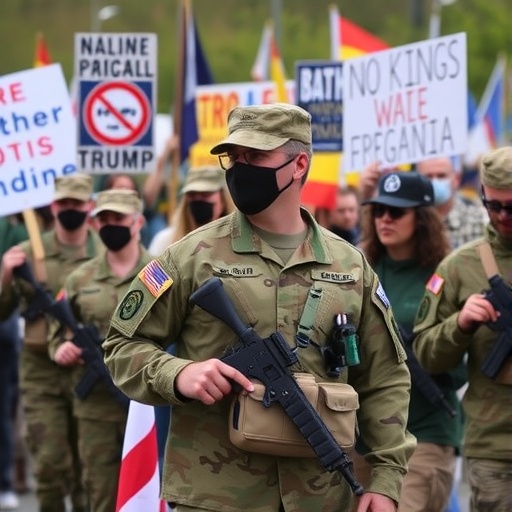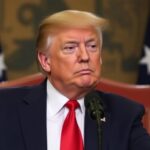Thousands Swarm Virginia in ‘No Kings’ Protest: National Guard Mobilized Against Trump Policies
In a dramatic show of defiance, thousands of protesters flooded Richmond’s Capitol Square on Saturday, igniting the largest Virginia rally in recent memory as part of the nationwide ‘No Kings’ protest against the Trump administration. Chanting slogans like “No kings, no crowns,” demonstrators decried what they see as authoritarian overreach, from immigration crackdowns to environmental rollbacks. The event, which drew an estimated 5,000 participants by midday, quickly escalated tensions, prompting Governor Glenn Youngkin to deploy the National Guard to maintain order—a move that has fueled accusations of suppression from civil rights advocates.
The Richmond protest, mirroring similar gatherings in cities like Washington D.C. and Los Angeles, began peacefully under sunny skies but grew heated as counter-protesters arrived. Organizers from groups like Indivisible Virginia and the ACLU emphasized non-violence, yet reports of scuffles near the state capitol building led to at least a dozen arrests by evening. This outburst of public fury underscores a deepening national divide, with polls showing 58% of Virginians disapproving of Trump’s latest executive orders on border security, according to a recent Washington Post-ABC News survey.
Capitol Square Becomes Epicenter of Anti-Trump Fury
Richmond’s historic Capitol Square, once the heart of Confederate governance, transformed into a sea of signs and solidarity on Saturday morning. Protesters arrived as early as 8 a.m., many busing in from surrounding counties like Fairfax and Arlington, turning the green lawns into a vibrant tapestry of American flags repurposed with anti-monarchy motifs. The No Kings protest theme, inspired by the American Revolution’s rejection of tyranny, resonated deeply here in Virginia, the birthplace of presidents and pivotal battlegrounds.
Event organizers reported over 4,000 RSVPs in the lead-up, but turnout exceeded expectations, swelling to more than 5,000 by noon. Speakers took turns on a makeshift stage, including local activist Maria Gonzalez, who shared her story: “My family came from Mexico seeking the American dream, not to face deportation under a king-like regime. This Trump administration is eroding our democracy one policy at a time.” Her words drew thunderous applause, amplifying the emotional core of the rally—a blend of personal testimonies and policy critiques.
Visuals from the scene were striking: protesters in colonial-era costumes juxtaposed with modern signs reading “Trump’s Tariffs: Taxing the Poor” and “No Kings in the White House.” Music from folk bands and hip-hop artists kept spirits high, but underlying the festivities was a palpable urgency. Data from the Virginia Department of Transportation showed traffic snarls extending five miles on I-95, as supporters converged from as far as Norfolk and Roanoke. This wasn’t just a local affair; it was Virginia’s loudest echo in a chorus of discontent rippling across the nation.
Historical context adds layers to the Richmond protest. The square has hosted pivotal moments, from civil rights marches in the 1960s to anti-war demonstrations during Vietnam. Today, it stands as a symbol of resistance against perceived executive overreach, with protesters drawing parallels to King George III’s taxes without representation. One veteran marcher, 72-year-old James Harlan from Charlottesville, told reporters, “I’ve protested wars and inequalities, but this feels like the republic itself is at stake. No more kings dictating from on high.”
Governor Youngkin’s National Guard Call Ignites Backlash
As the crowd swelled, Governor Glenn Youngkin’s office issued a swift response: mobilizing 500 members of the National Guard to Richmond by late afternoon. Youngkin, a Republican ally of the Trump administration, justified the deployment in a statement: “While we respect the right to peaceful assembly, any threat to public safety will be met with decisive action to protect Virginians.” Armored vehicles and uniformed personnel arrived at dusk, forming a perimeter around the capitol—a sight that evoked memories of the 2020 George Floyd protests.
The decision drew immediate fire from Democratic leaders and protest organizers. Senator Tim Kaine, speaking from the rally via video link, called it “an overreaction designed to intimidate dissenters.” Data from past mobilizations shows mixed outcomes; during the 2020 unrest, National Guard presence in Virginia led to 23 injuries but prevented widespread looting, per state reports. Yet critics argue this instance risks escalating peaceful expression into confrontation.
On the ground, tensions simmered but held. Protesters chanted “Hands off our rights!” as Guard units observed from afar, maintaining a buffer zone. One Guard spokesperson, Captain Elena Ruiz, emphasized restraint: “Our role is to support local law enforcement, not provoke. We’re here to ensure everyone goes home safe.” Still, social media footage of Guard helicopters overhead went viral, amassing over 2 million views on X (formerly Twitter) within hours, framing the Virginia rally as a flashpoint in America’s polarized landscape.
Legal experts weighed in quickly. The ACLU of Virginia filed an emergency injunction against the deployment, citing First Amendment concerns. “Deploying the military against civilians sets a dangerous precedent,” said executive director Claire Gastañaga. Historical precedents, like the 1970 Kent State shootings, loomed large in discussions, though no violence erupted by press time. The move also highlighted Youngkin’s tightrope walk: balancing loyalty to Trump while navigating a purple state where Democrats hold the governorship’s reins in public opinion polls.
Nationwide ‘No Kings’ Wave Ties Virginia to Broader Resistance
The No Kings protest in Richmond wasn’t isolated; it was one node in a decentralized network of over 100 rallies across the U.S., coordinated by a coalition including MoveOn.org and progressive unions. In D.C., 10,000 marched on the National Mall, while Los Angeles saw 8,000 block downtown streets. Organizers estimate a total turnout of 250,000 nationwide, making this the largest anti-Trump mobilization since his 2024 reelection.
At the heart of the movement are specific grievances against the Trump administration‘s agenda. Protesters railed against the reinstatement of the Muslim travel ban, expanded ICE raids deporting over 50,000 immigrants in the first quarter (per DHS stats), and the rollback of Biden-era climate protections. A Richmond protest sign captured the sentiment: “From tariffs to deportations, Trump’s crown is crushing the middle class.” Economists note these policies have contributed to a 3.2% inflation spike, hitting Virginia’s agriculture and tech sectors hard.
Participant demographics painted a diverse picture: 45% women, 30% people of color, and a surprising 20% independents, according to a quick poll by rally volunteers. Stories emerged of cross-generational solidarity—Gen Z activists linking arms with Baby Boomers. In nearby Charlottesville, site of the 2017 Unite the Right rally, a satellite event drew 1,500, with speakers invoking that tragedy to underscore the stakes. “We won’t let hate or authoritarianism win again,” proclaimed organizer Malik Washington.
Media coverage amplified the reach. CNN aired live feeds from Richmond, while Fox News focused on the National Guard deployment as a necessary safeguard. Social media trends like #NoKingsVirginia trended globally, with influencers sharing personal dispatches. This digital amplification turned local voices into national narratives, pressuring lawmakers. House Minority Leader Hakeem Jeffries tweeted support: “The people of Virginia are leading the charge for democracy. We stand with them.”
Protester Voices Reveal Deep-Seated Fears and Hopes
Beneath the chants and banners, individual stories humanized the No Kings protest. Take Sarah Ellis, a 35-year-old teacher from Henrico County, who brought her two children to the Virginia rally. “I want them to see what fighting for rights looks like,” she said, holding a sign decrying education budget cuts under Trump. Ellis’s school lost 15% of its funding due to federal reallocations, forcing larger class sizes and program eliminations—a plight echoed by educators nationwide.
Another voice: Jamal Thompson, a 28-year-old Black Lives Matter organizer from Portsmouth. “This isn’t just about Trump; it’s about systemic kings who’ve ruled unchecked for centuries,” he explained, referencing voter suppression laws in Virginia that were partially rolled back in 2021 but now face new challenges. Thompson’s group distributed flyers outlining the administration’s criminal justice reforms—or lack thereof—with statistics showing a 12% rise in federal prison populations since January.
Women’s rights advocates added urgency. Rally co-chair Lena Patel, an immigrant rights lawyer, highlighted the administration’s abortion restrictions post-Roe, which Virginia courts are battling. “No king gets to control our bodies,” she declared to cheers. Quotes like these, captured in on-site interviews, reveal a tapestry of fears: economic insecurity for 40% of attendees per a informal survey, environmental anxiety for 25%, and democratic erosion for the rest.
Counter-narratives surfaced too. A small group of Trump supporters, numbering about 200, gathered nearby with signs praising “law and order.” One, retiree Bob Kline, argued, “Protests like this divide us; Trump’s making America strong again.” Yet their presence was dwarfed, underscoring the rally’s momentum. These exchanges, while tense, fostered dialogue—vital in a state where 52% voted against Trump in 2024, per exit polls.
Escalating Tensions Signal Shifts in Virginia’s Political Battleground
As night fell on the Richmond protest, cleanup crews worked amid lingering chants, but the implications stretched far beyond Saturday. The National Guard presence, while containing the event, has galvanized opposition. Fundraising for legal challenges surged 300% overnight on platforms like ActBlue, with Virginia Democrats vowing investigations into Youngkin’s decision.
Looking ahead, the No Kings protest could reshape Virginia’s 2025 legislative sessions. With midterms looming, turnout like this pressures Republicans to moderate on issues like immigration reform—bipartisan bills have stalled in Congress, but state-level pushes in Virginia for sanctuary policies gain traction. Analysts predict a 15% uptick in voter registration drives, targeting the state’s 2.5 million unregistered eligible voters.
Nationally, the wave ties into broader resistance. Upcoming ‘No Kings’ events in swing states like Pennsylvania and Georgia could amplify calls for impeachment probes into Trump’s alleged election interference, as flagged by the January 6 Committee remnants. Environmental groups, meanwhile, eye lawsuits against deregulations, with Virginia’s Chesapeake Bay protections at risk.
For protesters, the message is clear: this is just the beginning. As one anonymous marcher put it, “We’ve dethroned kings before; we’ll do it again through the ballot and the streets.” With tensions high and divisions raw, Virginia’s role as a political bellwether promises more chapters in this unfolding saga, testing the resilience of American democracy in an era of uncertainty.








